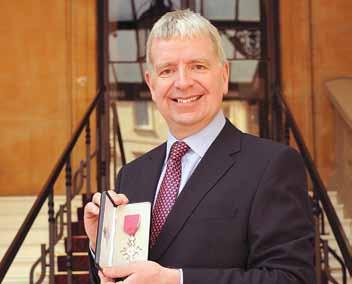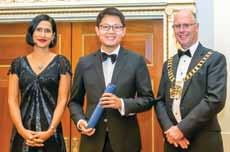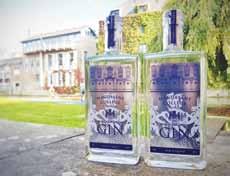
6 minute read
Exciting Times
By Miss Leaf Arbuthnot (2010)
I left Magdalene in 2014 having read French and Italian under the brilliant care of Dr Hugues Azérad and Ms Silke Mentchen.
Advertisement
Now I write and edit features at the Sunday Times and review poetry for the Times Literary Supplement. I’m writing my first book, a novel called Looking For Eliza, which is to be published by Orion in spring 2020 – they took on the book, somewhat rashly I fear, off the back of the first few chapters and a synopsis. Now I’m bashing out the remaining 80,000 words before and after my day job at the Sunday Times.
Three years into my career as a notso-ruthless hack, I’m struck by the fact that a lot of the skills I rely on today were acquired or honed at Cambridge. Studying MML meant that I had to learn to read fast, make links (or ungainly leaps) between ideas, overcome the fear of the blank page in order to cough up the required essays. Those skills are vital if you want to interview people properly for the purposes of writing an article about them, whether it’s Prince Charles, whom I met in a muddy field in 2017, or Hilary Mantel, whom I spoke to at home in Budleigh Salterton. I’d read a few of Mantel’s books before but had to race through the rest in about 24 hours, having been told by my editor that the interview was on. In Prince Charles’ case, I suddenly had to become a Windsor fanatic. If you don’t know your interview subject well, there’s a strong possibility they’ll detect that and their ego will be bruised so they won’t open up to you – moreover, you won’t know which questions to ask, which soft spots to probe, what makes them happy, and so on. All very important things in getting the measure of someone.
Doing profile interviews requires a certain chameleon-like quality that linguists, I think, have in spades. You ribbon between registers. If I’m interviewing an elderly man about his time during the war, I’m going to be a very different person to the woman I put forth when I’m interviewing young people about the drill scene in Peckham. To an extent we all do this all the time; to be human is to hopscotch between different identities – I once saw a very posh friend of mine call a cabbie “mate”, dropping the “t” because he sensed it was appropriate – but I am hyperaware when I’m working, of having to do it, and of there being consequences of me not mastering those subtle pivots (ie, the interview not going well, my interviewee and me not quite “clicking”).
At Cambridge I was never one for the late-night essay crisis. I was too conscientious, too boring. Now I recognise that being good at spurting out an essay at top speed serves journalists well. In 2016 we bagged the big exclusive interview with Candice Brown after she won the Great British Bake Off – the conversation started at 6pm on Thursday and I had until noon the next day to turn that into 2,500 words of a profile. I spent hours after we spoke typing out the transcript, smashed out as much of the piece as I could, went to bed then returned to my desk at seven the next day. There was no time to feel nervous, it had to be done. Thankfully in features the consequences are never as dire as they are in other areas of journalism – you’re not being bombed on as you file your story and there’s rarely a risk you’ll be scooped.
I began writing poetry reviews for the Times Literary Supplement a few months before I started at the Sunday Times, after I’d finished at Yale (where I’d spent a year on the Henry Fellowship). I’ve always loved poetry and basically wanted free books. I’d done a bit of poetry stuff as an MML student but not that much, though I loved the brimstone of Dante. I do as many reviews as I can around my job at the Sunday Times. It’s worth it: reviewing a collection forces you clarify your thoughts about it more than if you were reading it for pleasure. You have to investigate your hunch about why something works or doesn’t work, turn that hunch into an actual articulated position. That is good exercise for the brain and rewarding long-term; poems you have properly thought through have a way of lingering longer in the memory.
Being a judge in last year’s Michael Marks Awards for Poetry Pamphlets was one of the best things I’ve ever done – I had to read over 200 pamphlets, many of which were moving, funny, shocking – and then work out which collections were the most interesting. Talking about the poetry with my fellow two judges was a joy, both because their judgements were so sharp and because for me, poetry, like music, has always been rather a personal thing. It was a new experience, and deeply rewarding, to hear what my two intelligent and much more experienced fellow judges thought of material we had all read. In case you’re after recommendations, amongst the best collections I’ve reviewed in recent years are Beauty/Beauty by Rebecca Perry, Alice Oswald’s Falling Awake, and Nuclear Family by Mel Pryor.
MML at Magdalene was also a good training ground for my burgeoning work as a novelist. I did a good deal of 19th century French writing, and remember being struck by their attention to structure. When I began my book I didn’t pay nearly enough attention to its shape – I thought, arrogantly, that the right structure would impose itself as I wrote. That never happened; the writing ground to a halt and I realised I’d done the writerly equivalent of trying to build a big and impressive house without bothering to erect a scaffold. Many good novels have a secret solid skeleton under their flesh; things happen intentionally, people change intentionally, there is a music to it all – think of the pyramid structure of L’Assommoir. My book needed a scaffold if it was to become anything more than a mud hut. So I started planning chapters.
The book is set in Oxford. There are two main characters: a widow called Ada, whose late husband was a Primo Levi academic, and, living opposite her, a PhD student called Eliza. They are both isolated but for wildly different reasons; Ada is learning to be alone again and Eliza is struggling to connect to her academic work, to see the point in her research, and to form meaningful connections with other young people equally mired in the Instagram era. Eventually Ada decides to launch a start up, ‘Rent-a-Gran’, hiring herself out as a grandmother, as a way of making money and friends. The business goes well, then not so well.
The two women connect across the street, and the book charts that friendship. I wanted to write about loneliness as a phenomenon that cuts across the generations, and to show how the experience of it can forge connection rather than break it down. But god, writing novels is hard! My respect for all my old Cambridge professors who trotted off a book every few years, whilst finding the time to supervise students still hungover from Cindies, has reached all time highs.
www.magd.cam.ac.uk










